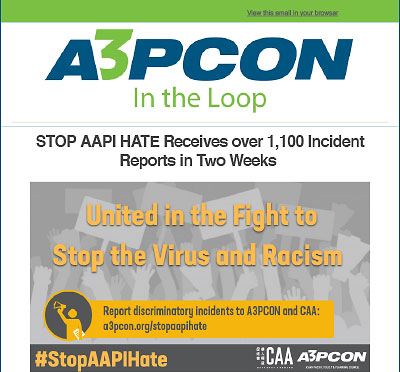America Faces Recovery From Two Epidemics
Abstract
Asian Americans and Pacific Islanders have been the target of hate crimes because they are being blamed for the COVID-19 pandemic. The climate of hate and racism in this country must be addressed if the nation is truly to recover from the impact of COVID-19.

Amid the COVID-19 pandemic and economic recession, the nation grieves its loss of lives, lifestyle, and livelihoods. At the same time, Asian Americans and Pacific Islander Americans suffer our own epidemic. We are targeted by hate speech and hate crimes that blame us for bringing the world to a halt—as if we even could.
As Americans, we all look forward to a day of healing, when we can put the surreal circumstances of empty streets, canceled school days, and furloughed work weeks behind us. But for this unprecedented pandemic, the solution may also be unprecedented—that racial divides must be healed for recovery of the nation to occur.
The novel coronavirus has revealed how interconnected we now are. Even in our households, most items began their lives elsewhere, in a global supply chain. Our computers, televisions, medications, furniture, and even grains of rice likely originated on the other side of the world and traveled to our homes. In the prior millennia, smallpox, also a respiratory virus, originated in prehistoric Africa and took over 2,000 years to reach Europe and the Americas. Yet within a period of four months, the novel coronavirus has reached every continent except Antarctica.
Amid problems on a global scale, the unimaginable occurs. In Midland, Texas, a boy shops with his family at Sam’s Club and is cut from ear to eye while his family is stabbed. The assailant confesses that his motive was to keep the Asian American family from spreading the coronavirus. In the Bronx, an Asian American woman sustains second-degree burns while taking out the trash after a man pours caustic fluid upon her. A woman on a bus requires stitches after teens call her racial expletives, accuse her of causing the coronavirus, and then assault her with an umbrella.
Over 1,400 incidents targeting Asian and Pacific Islander Americans were reported in three weeks to the Stop AAPI Hate tracker since the website was launched on March 19 by advocacy groups. At the same time, crime has decreased nationwide amid orders to stay at home to fight spread of the novel coronavirus. (AAPI stands for Asian American Pacific Islander.)

The recent hate activity toward Asian and Pacific Islander Americans exposes underlying and ready racism. Asian Americans have endured institutionalized racism from the Chinese Exclusion Act of 1882 to the internment of Japanese Americans during World War II. Even until 2006, the New Mexico state constitution forbade Asians from owning land. Although unenforced, the law was a humiliating reminder of the racism rooted in this nation’s history. This type of law once existed in half of the United States. History also tells us that when economic times are rough, scapegoating, blaming, and hate crimes increase.
Yet in 2020, China is a main partner of the United States. The American economy depends on China to purchase its treasury bonds and to manufacture many of its goods including medical masks, personal protective equipment, and medications. American colleges depend upon tuition paid by over 360,000 students from China. Will parents in Asia continue to send their children to this country, knowing they might be insulted or assaulted simply for being Asian?
In the 21st century, can the United States heal or participate in the global economy, when it harbors an epidemic of hate? We may not know when this country will reopen for school, work, and business. But the healing of America—its people, its soul, as well as its jobs and economy—will not be complete until it also heals from the epidemic of hate toward Asian and Pacific Islander Americans.
American leadership must focus on stamping out both epidemics. Much is at stake—the mental health of Americans, and more. ■
Stop AAPI Hate’s website is here.



